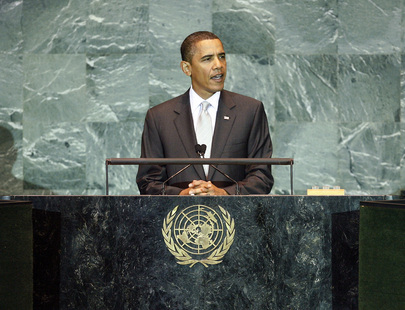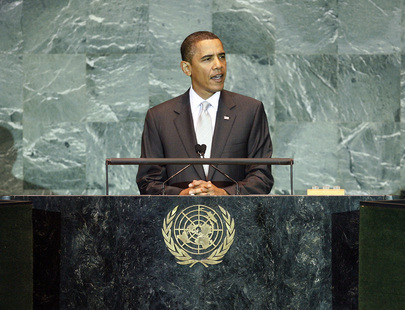 UN Photo/Marco Castro In a stunning announcement (full text below), “The Norwegian Nobel Committee has decided that the Nobel Peace Prize for 2009 is to be awarded to President Barack Obama for his extraordinary efforts to strengthen international diplomacy and cooperation between peoples.”
UN Photo/Marco Castro In a stunning announcement (full text below), “The Norwegian Nobel Committee has decided that the Nobel Peace Prize for 2009 is to be awarded to President Barack Obama for his extraordinary efforts to strengthen international diplomacy and cooperation between peoples.”
Obama won, in part, for reversing the immoral efforts of the Cheney-Bush administration to block and subvert international climate negotiations:
Thanks to Obama’s initiative, the USA is now playing a more constructive role in meeting the great climatic challenges the world is confronting.
We already knew that “Obama was willing to attend Copenhagen climate talks,” if he were invited. In an exclusive interview, Andrew Light, Center for American Progress Senior Fellow and an expert on international climate talks, explained to Climate Progress that now, effectively, he has been:
Barack Obama is now the third sitting president to be awarded the Nobel Peace Prize. This is an enormous honor. The timing on this for those following the future of a new international climate treaty could not be more critical. The Peace Prize is presented in Oslo on Dec. 10. The U.N. climate talks, where the agenda will feature decisions on replacing the Kyoto Protocol which expires in 2012, start in Copenhagen on Dec. 7. The expectation that President Obama will now go for at least part of the U.N. climate talks is enormous as he’ll already be in Scandinavia.
Light coordinates CAP’s participation in the Global Climate Network, focusing on international climate change policy and the future of the U.N. Framework Convention on Climate Change. He is also director of the Center for Global Ethics at George Mason University. He adds some historical perspective:
Remember that Al Gore went immediately to the U.N. climate meeting in Bali after accepting the Nobel Peace Prize jointly with the Intergovernmental Panel on Climate Change in 2007. Gore’s speech at the Bali meeting, and closed door sessions with climate negotiators for two days following, is credited by some as having saved those talks from failure. Before Gore arrived the E.U. was about to walk out over protests that the U.S. was holding up progress on the ‘Bali Action Plan,’ the document that set the parameters for what success at Copenhagen is supposed to look like this December. It’s hard to imagine a more directed appeal for President Obama to come to Copenhagen and achieve a similar success.
While some may argue that this award is premature, I disagree. This is a clear statement by the Nobel Committee not merely of the importance of U.S. multilateralism to genuine progress toward global peace, but also of their understanding that climate change has become a critical international issue.
Unrestricted emissions of GHGs represent perhaps the gravest, preventable threat to future world peace — a growing source of future strife, refugees, conflict, and wars (see “Memorial Day, 2029“). Al Gore and the IPCC won in 2007 “for their work to alert the world to the threat of global warming.” Alerting the world was and is vital. Taking action is even more crucial.
Obama and his international negotiating team led by Secretary of State Clinton have helped create the first genuine chance that the entire world will come together and agree to sharply diverge from the catastrophic business-as-usual greenhouse gas emissions path. This award simultaneously acknowledges what they have achieved and pushes them and the world toward delivering on Obama’s promise. It is well deserved.
Here is the Nobel committee’s full statement:
The Norwegian Nobel Committee has decided that the Nobel Peace Prize for 2009 is to be awarded to President Barack Obama for his extraordinary efforts to strengthen international diplomacy and cooperation between peoples. The Committee has attached special importance to Obama’s vision of and work for a world without nuclear weapons.
Obama has as President created a new climate in international politics. Multilateral diplomacy has regained a central position, with emphasis on the role that the United Nations and other international institutions can play. Dialogue and negotiations are preferred as instruments for resolving even the most difficult international conflicts. The vision of a world free from nuclear arms has powerfully stimulated disarmament and arms control negotiations. Thanks to Obama’s initiative, the USA is now playing a more constructive role in meeting the great climatic challenges the world is confronting. Democracy and human rights are to be strengthened.
Only very rarely has a person to the same extent as Obama captured the world’s attention and given its people hope for a better future. His diplomacy is founded in the concept that those who are to lead the world must do so on the basis of values and attitudes that are shared by the majority of the world’s population.
For 108 years, the Norwegian Nobel Committee has sought to stimulate precisely that international policy and those attitudes for which Obama is now the world’s leading spokesman. The Committee endorses Obama’s appeal that “Now is the time for all of us to take our share of responsibility for a global response to global challenges.”
Kudos to President Obama for inspiring the world and for starting to deliver on his unprecedented agenda of change. Kudos to the American public for rejecting the narrow, unilateralist, climate-destroying policies of his predecessor.




